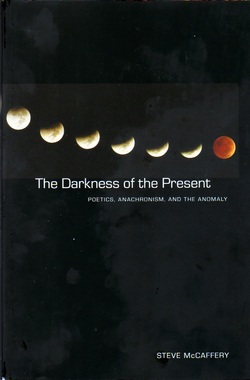
I was reflecting last month that I’d seen very little mention in Canada of poet Steve McCaffery’s fifth book of essays, The Darkness of the Present, even though it’s now been almost two years since it was released. I’m not sure that it has been reviewed except for a summary of its contents by Garry Thomas Morse last March in his Talonbooks blog. Perhaps the University of Alabama Press doesn’t send review copies to Canada – I’m still waiting for one of a more recent title.
Or possibly McCaffery’s essays on the avant-garde in Europe and the US fall outside the coverage of Canadian reviewers – not sufficiently about Canadian writing for a Canadian Literature journal and not sufficiently scholarly for a journal focused on scholarship by Canadians. Or possibly, even though McCaffery has published almost twenty books in Canada, has had a selected poems published in the Wilfrid Laurier UP series, and is identified by Wikipedia as a “Canadian poet,” his Canadian credentials are in question. He was born in Yorkshire in 1947, came to Canada in 1968, and has taught at the State University of New York in Buffalo for the past decade. In this new collection he describes Canada as his “former home” (181) – something which could trouble the Canadian presses who still publish most of his poetry despite its writer appearing to imagine his readers and literary context to be in the US. Globalization has so far made only very large English-language book markets truly ‘global.’
The main focus of this collection is the history of the Euro-American avant-garde and McCaffery’s contentions that it has been wrongly conceived as linear when its actual history has been discontinuous, often blind, and often unknowingly repetitious. Thus the title, in which the ‘present,’ according to McCaffery, exists in a darkness about the past, much the way the medieval ‘dark ages’ have often been presumed to have existed in darkness about the knowledges of Greece and Rome. He repeatedly here brings to notice much earlier texts which he suggests anticipate
A second focus of McCaffery's book is the postwar collapse of the lyric poem. Resonating throughout is Theodore Adorno’s now well-known 1949 observation that “To write poetry after Auschwitz is barbaric. And this corrodes even the knowledge of why it has become impossible to write poetry today.” McCaffery assumes here that “poetry” for Adorno was aesthetic poetry – poetry aimed toward beauty – and in a superb opening essay on Hugo Ball, “Cacophony, Abstraction and Potentiality: the Fate of the Dada Sound Poem” – argues that Ball’s cacophonous sound poems were reactions to the mechanized warfare of World War I and the barbarized languages of that war’s propaganda. “In these phonetic poems we totally renounce the language that journalism has abused and corrupted. We must return to the innermost alchemy of the word, we must even give up the word too, to keep for poetry its last and holiest refuge,” he quotes Ball as writing in 1916. Ball here would seem to be anticipating Adorno, and making the latter’s observation of the hypocrisy which twentieth-century war has revealed to lie at the base of human claims to love beauty into a repetition, a possible redundancy. One of the two writers' statements is an anachronism.
McCaffery’s two concluding essays – “The ‘Pataphysics of Auschwitz” and “The Instrumental Nightingale” – create a Ball-Adorno frame for the book. In the latter he considers Paul Celan’s poem “Death Fugue” as read through critic Paul Felstiner’s description as “the Guernica of postwar European literature” and as “the benchmark for ‘poetry after Auschwitz’” (208), and then adds this remark: “I might offer a final conjecture that perhaps Adorno’s proclamation on the word should be extended to music in the contemporary world. For after Auschwitz there is no music tinged from on high, not even a theological music that has any right unless it undergoes a transformation” (209). These ‘bookend’ essays make the essay collection a kind of irregular meditation on the impossibility and hypocrisy of seeking beauty – or any aesthetic goal – by means of poetry since the two cataclysmic global wars.
In between these are essays that consider the difficult writings of various poets, mostly American, that have declined beauty – Ronald Johnson, Jackson Mac Low, John Cage, Clark Coolidge, Kenneth Goldsmith, various Flarfists. Often McCaffery seems to be intent on indirectly distinguishing their work from his own, offering praise with some reserve, and thus locating himself within the conflicted field of current US ‘avant’ poetries. Although he mentions six or seven younger Canadian writers in passing, he discusses only Bill Kennedy and Darren Wershler-Henry’s 2006 Apostrophe at any length. There are certainly other and older Canadian poets whose beauty-abjuring work would seem relevant to McCaffery’s reflections – Eli Mandel (who similarly pondered Adorno’s Auschwitz words) and Phyllis Webb for example – and who could also serve his “anachronism” and “anomaly” thesis. Perhaps he has forgotten them, much like others have forgotten all the other apparently obscure but still relevant texts that he recalls here. There is of course an economy of remembering, as of writing – not everything of possible importance can be remembered, or be mentioned in a 280 page book.
FD
 RSS Feed
RSS Feed